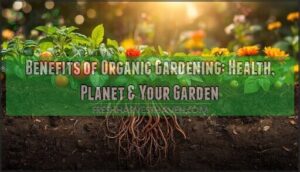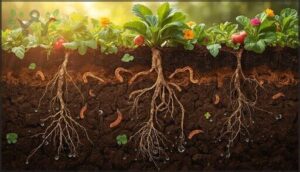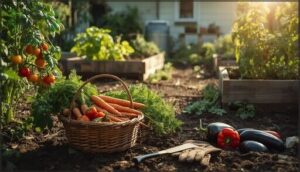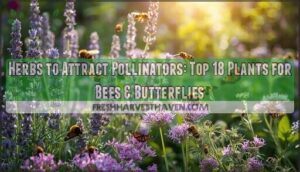This site is supported by our readers. We may earn a commission, at no cost to you, if you purchase through links.
You plant a seed, and something wonderful happens beneath your feet. That tiny plot of soil becomes home to thousands of earthworms, dozens of beneficial insect species, and millions of microorganisms working together to create a thriving ecosystem.
When you choose organic gardening methods, you’re not just growing tomatoes or zucchini—you’re building a miniature nature reserve that bolsters pollinators, purifies water, and enriches the earth without synthetic chemicals.
The benefits of organic gardening extend far beyond your garden fence, touching your health, your wallet, and the environment in ways that might surprise you. From slashing pesticide exposure by 97% to cutting your grocery bills while harvesting the most flavorful produce you’ve ever tasted, organic methods offer practical advantages that conventional gardening can’t match.
Table Of Contents
- Key Takeaways
- Environmental Benefits of Organic Gardening
- Health Advantages of Organic Gardening
- Economic and Practical Benefits
- Superior Food Quality and Taste
- Sustainable Gardening Practices
- Frequently Asked Questions (FAQs)
- What are the benefits of organic gardening?
- What are the benefits and disadvantages of organic gardening?
- Why is organic gardening better than non-organic gardening?
- Why should you go organic in your lawn & garden?
- Why is soil important in organic gardening?
- Why should you go organic?
- Is organic gardening a success?
- What is the main benefit of organic farming?
- Is organic gardening worth it?
- What tools are essential for starting organic gardening?
- Conclusion
Key Takeaways
- Organic gardening slashes pesticide exposure by up to 97% while boosting soil microbial life by 76%, creating a thriving underground ecosystem that naturally controls pests and enriches your harvest.
- You’ll cut grocery bills significantly—some families save nearly $7,000 yearly—while growing produce with 27% more vitamin C and flavors that supermarket options simply can’t match.
- Your garden becomes a wildlife refuge, supporting 50% more pollinator diversity than conventional spaces, with cover crops reducing soil erosion by up to 100% and rain gardens cutting stormwater runoff by 63%.
- Composting kitchen scraps and yard waste keeps 32% of household trash out of landfills while replacing expensive synthetic fertilizers, proving that working with nature beats fighting against it.
Environmental Benefits of Organic Gardening
When you choose organic gardening, you’re not just growing plants—you’re protecting the planet beneath your feet. Every decision you make, from skipping synthetic chemicals to building healthier soil, ripples outward to benefit pollinators, waterways, and wildlife.
Let’s look at four key ways your organic garden makes a real environmental difference.
Reducing Chemical Pollution
When you choose organic gardening, you’re keeping harmful pesticides out of your soil and water. Studies show organic systems cut synthetic pesticide use by about 97%, dramatically lowering soil residues and water contamination.
This chemical-free gardening approach protects local waterways from runoff, reduces air pollution from fertilizer production, and limits human exposure to toxic drift—creating safer spaces for your family and neighborhood.
In fact, conventional soils contain pesticide residues more often.
Supporting Pollinators and Wildlife
Beyond protecting water, organic gardens become thriving wildlife refuges. Research shows organic sites support about 50% higher pollinator diversity than conventional spaces, thanks to pesticide reduction and rich floral resources. A recent study highlighted organic farming’s benefits to pollinator populations.
Your garden can deliver powerful ecosystem services by:
- Providing safe foraging habitats for bees and butterflies year-round
- Creating habitat structure with layered plants that shelter beneficial insects
- Acting as stepping-stone corridors that connect fragmented landscapes
You’re building more than a garden—you’re weaving a lifeline for struggling pollinator populations.
Improving Soil Health and Biodiversity
Healthy soil is the heartbeat of any organic garden, and you’ll watch it come alive under your care. Organic practices boost soil organic matter by 10–20% and microbial biomass by up to 76%, creating nutrient-rich soil teeming with life. Species richness jumps about 30% higher than in conventional plots, improving soil health and ecosystem health. You’re not just feeding plants—you’re weaving a thriving underground community that anchors carbon sequestration and balances water dynamics naturally.
Organic gardening builds nutrient-rich soil teeming with life, boosting microbial biomass up to 76% and anchoring a thriving underground ecosystem
| What Happens Below Ground | Why It Matters to You |
|---|---|
| Microbial biomass increases 64–76% | Stronger, disease-resistant plants |
| Soil organic matter rises 10–20% | Better water retention and drainage |
| Species richness climbs ~30% | Natural pest control and resilience |
| Carbon sequestration reaches 0.8 Mg/ha/year | Climate-positive gardening impact |
Controlling Erosion and Stormwater Runoff
Thriving soil does more than feed roots—it holds ground when storms roll through. Organic gardens excel at controlling stormwater and reducing erosion through strategic vegetation impact and slope stabilization. Cover crops cut soil loss by 31–100%, while compost amendments establish thick protective layers that prevent washout. Rain gardens with prairie plants infiltrate water three times faster than turf, turning your plot into a natural sponge. You’re practicing water conservation and environmental protection with every planting choice.
How organic methods anchor your soil:
- Cover crops like rye and clover slash erosion by up to 100%
- Compost layers improve vegetation and stop visible soil loss
- Rain gardens reduce runoff volume by an average of 63%
- Tree canopies intercept 760–3,000 gallons of rainfall yearly
Health Advantages of Organic Gardening
Organic gardening doesn’t just benefit the planet—it offers real advantages for your health, too. When you skip synthetic chemicals and grow your own food naturally, you’re making choices that protect your body and support your overall well-being.
Let’s look at three key ways organic gardening can improve your health.
Lowering Exposure to Harmful Chemicals
When you grow your own organic produce, you’re protecting your family from harmful chemicals in a tangible way. Studies show organic foods contain roughly three times fewer pesticide residues than conventional options, and switching to organic for just one week can reduce organophosphate exposure by 89%. That’s powerful Pesticide Residue Reduction that matters most for children and other vulnerable populations.
| Exposure Type | Impact of Organic Choice |
|---|---|
| Organophosphate Exposure | 89–96% reduction in one week |
| Glyphosate levels | 70% decrease within days |
| Body Burden Decrease | Detectable in children immediately |
| Household Contamination | Fewer residues enter your home |
By choosing chemical-free living through organic gardening, you’re directly reducing pesticide exposure where it counts—on your plate and in your body.
Enhancing Nutritional Value of Produce
One of organic gardening’s most compelling rewards is the nutrient-rich soil you create, which translates directly into healthier food on your table.
Research shows organic foods deliver micronutrient increases—often 21% more iron and 29% more magnesium—alongside elevated antioxidant levels and vitamin content.
Human biomarkers confirm these gains: frequent organic consumers show higher mineral content in their bloodstream, proving organic mechanisms genuinely improve what you eat.
Supporting Mental and Physical Well-Being
Beyond its environmental and nutritional advantages, gardening offers powerful health benefits for both mind and body. Studies confirm that horticultural therapy reduces stress, anxiety, and depression—with participants showing significant improvements in emotional well-being.
Regular physical activity in the garden enhances cardiovascular health, while social connection through community plots strengthens cognitive function and overall mental health.
Economic and Practical Benefits
Organic gardening doesn’t just benefit the planet and your health—it can also lighten the load on your wallet. When you grow your own food using natural methods, you’ll find that the savings add up in more ways than one.
Let’s look at three key ways organic gardening makes financial sense for your household.
Saving Money on Groceries
Your grocery bills can drop fast when you grow your own vegetables. One U.S. family slashed monthly food costs from $1,100 to $525 by expanding their organic garden, saving roughly $6,900 in a year.
Even a small 1.49 m² plot can produce $160 worth of produce annually. Garden grocery savings add up quickly, giving you real financial benefits and a self-sufficient diet.
Reducing Gardening Input Costs
Organic methods slash your ongoing expenses by replacing costly synthetic fertilizers and pesticides with compost creation and natural fertilizers. You’ll enjoy genuine financial benefits and cost savings while building healthier soil.
- Compost from kitchen scraps feeds your plants without purchasing chemical fertilizers
- Seed saving eliminates buying new packets each season
- Water conservation through mulching reduces irrigation bills
- Natural pest management replaces expensive chemical sprays
Increasing Household Self-Sufficiency
Your backyard garden transforms into a reliable food production system that shields you from grocery price spikes and supply disruptions. Research shows home gardens can provide over 20% of household food needs, with some intensive setups meeting complete vegetable requirements.
Seed saving, rainwater harvesting, and preservation techniques like canning extend availability year-round, building genuine resource resilience and a self-sufficient diet that buffers shocks when external systems falter.
Superior Food Quality and Taste
Beyond the environmental and economic wins, organic gardening delivers something you can actually taste. When you grow food without synthetic chemicals, you’re setting the stage for produce that’s fresher but also genuinely more flavorful and nutritious.
Let’s look at three ways organic practices improve what ends up on your plate.
Fresher, Tastier Fruits and Vegetables
There’s something magical about plucking a sun-warmed tomato straight from your garden. When you grow organic fruits and vegetables at home, you’re producing tastier fruits and veggies because they reach peak ripeness right on the plant. This means better sugar development, stronger sensory quality, and flavors that supermarket produce just can’t match.
- Vine-ripened means sweeter: Organic vegetables left to mature naturally develop higher sugar levels and aromatic compounds
- Freshness you can taste: Home-grown produce reaches your plate within hours, preserving texture and flavor
- Longer shelf life: Organic fruits often stay firmer and crisper during home storage
- No flavor fade: Commercial produce loses up to 75% of its vitamin C during shipping, dulling taste
Higher Vitamin and Mineral Content
Beyond taste, your homegrown organic produce delivers a nutritional edge. Research shows organic crops often contain higher vitamin C, magnesium, iron, and phosphorous levels than conventional produce. This nutrient density stems from soil health and natural fertilization effects that encourage plants to synthesize more vitamins and minerals. You’re not just growing food—you’re cultivating wellness.
| Nutrient | Organic Advantage |
|---|---|
| Vitamin C | 27% higher on average |
| Magnesium | 29% higher on average |
| Iron | 21% higher on average |
Antioxidant levels in organic fruits and vegetables also surpass conventional options, with some studies showing 17% higher total antioxidant activity. These compounds protect your cells and support long-term health, making every harvest a win for your body.
Lower Risk of Food Contamination
When you grow your own food organically, you dramatically cut pesticide residues—studies show organic samples contain about five times less than conventional produce. You’ll also sidestep multidrug-resistant bacterial contamination found more frequently in conventional meats and lower mycotoxin levels in grains.
Practicing proper composting, aging manure six months, and using clean water ensures your chemical-free food is safer from field to fork.
Sustainable Gardening Practices
Organic gardening isn’t just about what you don’t use—it’s about the smart, natural systems you create to keep your garden thriving season after season. When you build these sustainable practices into your routine, you’re working with nature instead of against it, which makes everything easier over time.
Let’s look at three core practices that form the backbone of any successful organic garden.
Composting and Waste Reduction
Composting turns your kitchen scraps and yard trimmings into black gold for your garden while keeping tons of waste out of landfills. In fact, food waste and yard debris make up about 32% of what we throw away nationwide.
By embracing garden compost, you’re:
- Reducing landfill waste and the methane it produces
- Creating nutrient-rich soil amendments that replace synthetic fertilizers
- Closing the loop on household waste while improving your soil’s health
This simple practice delivers real environmental and economic impacts for your home.
Natural Pest and Weed Control
When pests show up, you don’t need harsh chemicals to protect your plants. Biological control methods—like introducing beneficial insects or using organic pesticides—reduce pest populations by over 60% while keeping natural enemies thriving in your garden.
For controlling weeds organically, combining techniques such as flame treatment, tillage, and solarization works best.
Organic systems with greater habitat complexity support stronger natural pest control, proving that working with nature beats fighting against it.
Building a Thriving Garden Ecosystem
When you increase functional biodiversity by planting native species, you create wildlife habitats that support beneficial insects, pollinators, and a healthy soil microbiome. This symbiotic environment strengthens your garden’s food web and boosts ecosystem resilience.
Studies show that gardens with over 70% native plants maintain thriving populations of natural predators while improving soil health—building a self-sustaining ecosystem that practically tends itself.
Frequently Asked Questions (FAQs)
What are the benefits of organic gardening?
When you turn to organic gardening, you’re nurturing both your health and the planet. You’ll enjoy chemical-free produce with nutritional superiority, support ecosystem biodiversity, and embrace sustainable practices that build complete garden health.
What are the benefits and disadvantages of organic gardening?
Organic gardening benefits your health and the environment, but it requires more time commitment and initial investment than conventional methods. You’ll face pest challenges and possible yield differences, though sustainable gardening practices reward patience.
Why is organic gardening better than non-organic gardening?
You’re protecting your family from synthetic pesticides while building healthier soil and a thriving ecosystem.
Sustainable methods deliver long-term benefits—cleaner produce, richer biodiversity, and reduced environmental impact that conventional gardening simply can’t match.
Why should you go organic in your lawn & garden?
You’ll protect your family from harmful pesticides while growing nutrient-rich food.
Organic gardening builds healthier soil, aids pollinators, and creates a thriving ecosystem—all through sustainable practices that keep toxic chemicals out of your yard.
Why is soil important in organic gardening?
Soil health isn’t just dirt—it’s the foundation of your garden’s entire ecosystem. Nutrient-rich soil acts as a reservoir, supporting microbial biodiversity, water regulation, and erosion control that organic matter and soil organisms deliver.
Why should you go organic?
You’ll enjoy safer produce, better flavor, and a healthier lifestyle while supporting a sustainable future.
Chemical-free gardening reduces pollution, protects ecosystems, and delivers real environmental and health benefits—making every harvest more rewarding.
Is organic gardening a success?
Absolutely. Organic operations have expanded from 8 million to 9 million acres since 2000, and sales reached nearly $70 billion in Market growth proves consumer demand fuels long-term viability.
What is the main benefit of organic farming?
The core benefit lies in its systemic approach: organic farming nurtures soil health while reducing pesticide exposure, creating long-term impacts through comprehensive farming practices that simultaneously protect ecosystems, improve nutrition, and support regenerative agriculture principles.
Is organic gardening worth it?
If you’ve ever wondered whether growing food the natural way pays off—yes, a thousand times over.
The cost savings, health and wellness gains, and environmental benefits make organic gardening absolutely worth your time investment and space requirements.
What tools are essential for starting organic gardening?
You’ll need hand tool sets like a trowel and fork, watering essentials such as a hose with an adjustable nozzle, pruning tools, soil preparation implements, and protective gear like durable gloves to maintain soil health.
Conclusion
Where industrial farms rely on chemicals to force growth, your organic garden works with nature’s rhythms to create abundance.
The benefits of organic gardening ripple outward—from earthworms enriching your soil to pollinators finding safe haven, from pesticide-free meals nourishing your family to reduced grocery bills strengthening your budget.
Each seed you plant becomes an act of stewardship, proving that the smallest plot can make a meaningful difference for your health, your community, and the living world around you.
- https://www.sciencedirect.com/science/article/abs/pii/S0167880924005280
- https://pmc.ncbi.nlm.nih.gov/articles/PMC11467207/
- https://www.organicseurope.bio/content/uploads/2022/04/IFOAMEU_advocacy_organic-benefits-for-climate-and-biodiversity_2022.pdf
- https://www.nrcs.usda.gov/conservation-basics/natural-resource-concerns/soil/soil-health
- https://www.organic-center.org/organic-mitigating-adapting-climate-change












